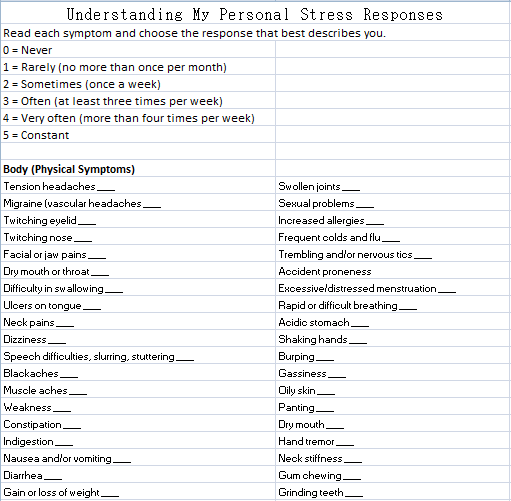Identifying the Symptoms of Stress
Physical Symptoms
- Sleep disorders
- Headaches
- Neck and back pain
- Cardiovascular problems (chest pain, palpitations, shortness of breath)
- Gastrointestinal problems (constipation, diarrhea, heartburn)
- Dizziness
- Chronic fatigue
- Memory problems
Emotional/Psychological Symptoms
- Anxiety
- Irritability
- Impulsiveness
- Anger or hostility
- Loss of control
- Periods of confusion
- Inability to concentrate
- Impatience
- Frustration
- Inability to feel appropriate extremes of joy or sadness
- Fatigue
Behavioral Symptoms
- Increased smoking
- Increased use of prescription drugs
- Increased intake of alcohol or nonprescription drugs
- Binge eating
- Compulsive dieting
- Chronic procrastination
To know more about how stressful you are, here is a checklist that the writer offered "Understanding My Personal Stress Responses." Try to be as objective as possible when completing it. Don't downplay symptoms that might embarrass you, and don't exaggerate anything. Be honest, and trust the checklist to provide a clear picture of your physical self as it relates to stress.
You may have struggled to choose a dominant symptom from each category, but it's worth the effort. This work is necessary to establish your personal BestStress Zone. You may discover that you have different symptoms in various settings (i.e., workplace, family gatherings, social situations, or place of worship).
Based on this exercise, you should now have a self-portrait of your current tendencies in response to the demands and challenges in your life. The next step is to link the symptoms to a stress source. This can be done easily with a daily record of what you experience. You can call it a "Stress Diary." Either jot things down on paper or create a diary on your favorite electronic device. The idea is to write down each symptom immediately -- as soon as you notice it.
(Source: Scott, C. J. Optimal Stress - living in your best stress zone. New Jersey: John Wiley & Sons, Inc., 2010.)
× 『rui@96yR』【butterflyuu】 ×




Komentar
Posting Komentar